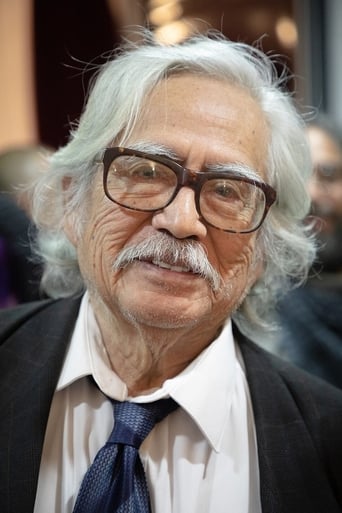Stoutor
It's not great by any means, but it's a pretty good movie that didn't leave me filled with regret for investing time in it.
filippaberry84
I think this is a new genre that they're all sort of working their way through it and haven't got all the kinks worked out yet but it's a genre that works for me.
Jakoba
True to its essence, the characters remain on the same line and manage to entertain the viewer, each highlighting their own distinctive qualities or touches.
Darin
One of the film's great tricks is that, for a time, you think it will go down a rabbit hole of unrealistic glorification.
Amanda Madrigal
While at times Carlos Carrera's film adaptation of The Crimes of Padre Amaro seemed to progress slowly, the significance of the film was not lost. The silent dialogue powered the film ---the unspoken sentences allude to the hidden hypocrisy, greed, and corruption within the church. So much of the film's language was captured through lightening, camera movement, and glances shared amongst the actors of the film.Viewing this film the audience glimpses into Amaro's mind. The camera travels to give insight into the thoughts of the Padre Amaro. Natural light or very little lighting is frequently utilized in the film to mask the characters half-hidden in shadows and to emphasize specific focal points such as eyes and close views of facial expression. Often the camera lingers emphasizing the silent or somber moments of the film, the moments when these individuals are lost to contemplate their predicaments.In many instances this film draws us away from the religion that permeates the film only to call us back and remind us that these are people obligated to their faith---an oath. This is done with music as well as the focus of the camera. Very little music is used in the film. In scenes of intense passion---such as the first truly intimate moments of Amelia and Amaro music is deliberately removed from the scene. This is a scene that is neither glamorized nor criticized. Aside from music heard coming from car radios etc. the only other music used throughout the film was classical often played in times of conflict between the actions and the religion of the characters. Like music, the camera plays upon these times of internal/external conflict. When Amaro and Amelia share their first kiss in the pews of the church the camera pans away from these two people and instead zooms in upon the figure of a porcelain Virgin Mary.The film successfully draws attention to the very reality of conflict that exist between religion, politics, and the internal struggles of the individuals within these systems.
JonathanLuther
Directed by Carlos Carrera, starring Gael Garcia Bernal (Amaro), Sancho Gracia (Benito), and Ana Talancon (Amelia), this film examines the presence of the Catholic church in Mexico and the grip it has on Mexican politics and reality (ironically, efforts were made by the church to block the film). It is based on the Portugese novel "O Crimen do Padre Amaro" by Queiroz. There are no fast-paced, action-packed and flashy qualities present in many blockbusters nowadays, but the film does keep one's interest in the melodrama and hypocrisy that unfolds.The movie starts with a fresh, newly ordained priest (Amaro) who is sent to a small town to study under the seasoned Benito. Amaro is immediately awakened to hypocrisy and corruption that his Catholic counterparts are steeped in. Amaro's morality is tested against his ambition, and the things like love and truth fall victim to his quest for power.The movie asks the crucial question, "What place does the Catholic church have in the modern era?" The movie treats the tradition of the church as an artifact, lost long ago and replaced by actions that are non-compatible with its teachings. This is voiced by Carrera in the opening scene where Amaro drives by Catholic tombstones: "They don't mean anything - they are forgotten." But the church remains very powerful, having symbiotic relationships with drug lords, government and media that allow it to persist and influence Mexico.So much detail was taken in the film's depiction of Mexico: the contrast of modernity and tradition (donkeys and cars on the streets), the economic woes of the 1990s and resulting corruption, the Catholic church's scandals, and increasing liberalism at the time. Although the movie does require some patience, it is well worth it. The film is thoughtful in every possible way, and the two main characters are quite the lookers.-JonLuther
Philby-3
Gael Garcia Bernal is a young actor of the moment, having made his mark in several interesting Mexican and Spanish films before tackling Hollywood. He is good at playing innocents who are about to learn that life is not so pure and wholesome as they imagined. In this film he plays a high-principled but weak-willed young Mexican Catholic priest who sets out to be a saint but becomes just another compromised clergyman. The story is taken from a 19th century Portuguese novel though updated to the present day. The film was not warmly received by certain Catholic activists who wanted it suppressed; in reality they are 125 years too late. The keen young Padre Amaro (Bernal) is sent by his worldly Bishop to a provincial town for some exposure to parish life. The local priest, Padre Benito (Sancho Gracia), is up to his eyeballs in sleaze. He is sleeping with local restaurant proprietor Augustina who provides his meals, and laundering money for the local drug baron via donations to his pride and joy, a local hospital under construction. He is also pressuring another local priest, Padre Natalio (Damián Alcázar), to stop supporting local guerrilla activity directed at the drug lords, and is suppressing unfavourable newspaper coverage of his activities. Padre Amaro is shocked at all this but nevertheless manages to fall in love with Augustina's 16 year old daughter Amelia (Ana Claudia Talancón). Amelia is easy prey - she becomes aroused just thinking of Jesus – and the Padre arranges a back room in his sacristan's workshop for their trysts. But it's hard to keep a secret in a small town; first Padre Benito finds out and then the egg hits the proverbial fan as Amelia discovers she is pregnant.The story does indeed not put the Church in a favourable light. The venalities of the clergy are exposed but what is perhaps more telling is that the faithful are faithful because they know no better. The faith has become a way of keeping people ignorant. As an adaptation from the novel the story is told in a straightforward narrative fashion. The main performances are very strong and the intimacy between Padre Amaro and Amelia beautifully portrayed. There are other minor interesting characters but there is not much space in a movie treatment for them.
Sherazade
This film came out around the peak of all that Catholic priests scandal saga and it had the right timing. The storyline however is far from calculated. It's a truly sad one, about a beautiful virginal girl who has everything in her life going for her, until she finds herself seduced by a handsome young priest. Before long, she loses her virginity to him and the relationship becomes more and more intensively sexual. In the end, she becomes pregnant and goes to tell her lover about it. He tells her that he cannot leave the church for her and suggests that she has an abortion and even escorts her to a quack doctor where the operation quickly becomes botched and the priest panics. Rather than take responsibility for his actions, he removes the girl from the clinic (meanwhile she is bleeding profusely) and tries to save her life while still saving his neck by keeping everything "hush hush". What happens next is something that will not only annoy the hell out of you but shock you to no end. The film was very well acted and shot but the context was just too sad for my liking.





